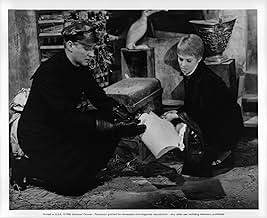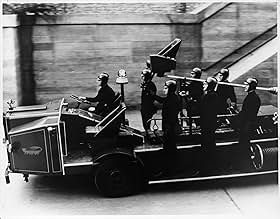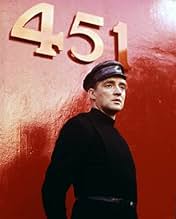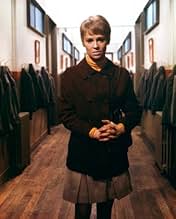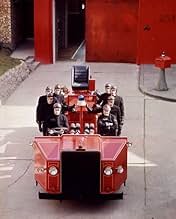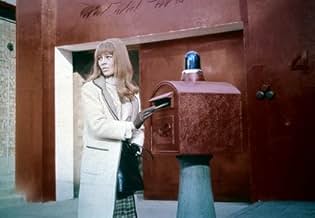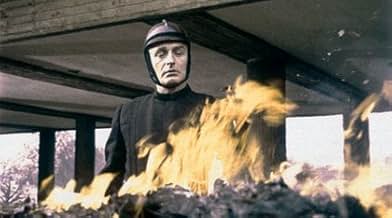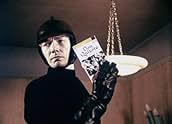ÉVALUATION IMDb
7,2/10
47 k
MA NOTE
Dans un avenir oppressif, un pompier dont le travail consiste à détruire tous les livres se met à s'interroger sur sa tâche.Dans un avenir oppressif, un pompier dont le travail consiste à détruire tous les livres se met à s'interroger sur sa tâche.Dans un avenir oppressif, un pompier dont le travail consiste à détruire tous les livres se met à s'interroger sur sa tâche.
- Nominé pour le prix 1 BAFTA Award
- 1 victoire et 4 nominations au total
Gillian Aldam
- Judoka Woman
- (uncredited)
Alfie Bass
- Book Person: 'The Prince'
- (uncredited)
Yvonne Blake
- Book Person: 'The Jewish Question'
- (uncredited)
Arthur Cox
- Male Nurse
- (uncredited)
Frank Cox
- Book Person: 'Prejudice'
- (uncredited)
Fred Cox
- Book Person: 'Pride'
- (uncredited)
Noel Davis
- Cousin Midge - TV Personality
- (uncredited)
Judith Drinan
- Book Person - Plato's 'Republic'
- (uncredited)
Kevin Eldon
- Robert - First Schoolboy
- (uncredited)
Avis en vedette
From Ray Bradbury's novel about totalitarian society that has banned books and printed words in order to eliminate independent thought; Oskar Werner plays professional book-burner who becomes enraptured with stories. Possibly a bit too thin at this length, but a fascinating peek at a cold future (which the times have just about caught up to). Didn't get a warm reception from critics in its day, yet the performances by Werner and Julie Christie (in a dual role as both Werner's wife and a rebel acquaintance) are top notch. I was never a fan of director François Truffaut's too-precious stories of childhood, but this film, curiously his only English-language picture, is extremely well-directed; the sequence with the woman and her books afire is one amazing set-piece, with tight editing, incredible and precise art direction, and the camera in all the right places. Truffaut lets you feel the agony of book paper curling up black in a mass of orange flames, and the proud defiance of the woman as she herself strikes the match. Unforgettable. *** from ****
A film about the deliberate dumbing down and control of the populace using information control is perhaps more relevant than ever but Fahrenheit 451 also shows it's age in many parts and the conclusion doesn't feel right to my sensibilities.
Even so it's a story worth knowing and still an effective - though at times glacially paced - film.
The acting is passable. It follows the rather stilted form common at the time but it still conveys the story well and since the characters are supposed to be emotionless and controlled it's also fairly effective.
All in all I would recommend anyone to see it. It's not as impactful as 1984 but still a classic story that should be remembered.
Even so it's a story worth knowing and still an effective - though at times glacially paced - film.
The acting is passable. It follows the rather stilted form common at the time but it still conveys the story well and since the characters are supposed to be emotionless and controlled it's also fairly effective.
All in all I would recommend anyone to see it. It's not as impactful as 1984 but still a classic story that should be remembered.
The Firemen take the knowledge, they won't permit, those with power make the rules, it's their remit, books are burned and turned to ash, as sparking kerosene arcs flash, if you're caught with contraband, they will commit. Montag works the fire, erasing texts, since meeting Clarisse he's increasingly perplexed, she's opened up a door, that's taken him to hidden floors, now he knows the flames he throws are all pretext.
It's not the greatest piece of filmmaking you've ever seen, and you can pull a wagon through some of the holes in the logic, but for its time, and as an example of how the few can control the many, it's still worth an exploration to benchmark where the world is all these years later.
It's not the greatest piece of filmmaking you've ever seen, and you can pull a wagon through some of the holes in the logic, but for its time, and as an example of how the few can control the many, it's still worth an exploration to benchmark where the world is all these years later.
Ray Bradbury's disturbing vision of a possible future comes vividly alive in this film adaption of Fahrenheit 451. Reading for pleasure is now banned although I imagine you must have a certain degree of literacy to read food can labels and directions to operate all kinds of machinery. But read for enjoyment or for education about the world beyond the small space of earth you frequent, that's a big no-no in this future America.
Oskar Werner stars in Fahrenheit 451, he plays a fireman who have a different function in this society. Buildings and such are now fireproof so fireman have become the enforcers of the ban against books. They seek and burn books in whatever quantities they find. A good job in a police state, but not a good one if you have an inquiring mind such as Werner has.
Julie Christie plays two roles, Werner's pleasure driven wife and a schoolteacher whose unorthodox for that society's teaching methods have brought her under scrutiny. She does a good job in both characterizations.
Bradbury's themes are grounded in reality. Looking at American history it was a crime in many slave holding states to educate a slave. Let them be happy in their ignorance and they might not get ideas about a better life and won't rebel.
But this is a society that's beyond that kind of formal slavery so the answer is the old Roman one of bread&circuses. The circus in this case is television which has evolved into an interactive medium. The vast wasteland that Newton Minow characterized television as back in the day has gone beyond anything Minow was having visions about. Entertainment has really dumbed down and the circuses aren't too far from what used to entertain the Romans.
In the supporting cast you will remember Cyril Cusack as the fire brigade captain who functions as the spokesman for this new world and Bee Duffring as the book lady who martyrs herself for knowledge in an unforgettable scene.
The ending is not Bradbury's, but one written by director Francois Truffaut. It is very much however in the spirit of the novel and a tribute to mankind's unquenchable thirst for knowledge. Don't miss Fahrenheit 451 when broadcast.
Oskar Werner stars in Fahrenheit 451, he plays a fireman who have a different function in this society. Buildings and such are now fireproof so fireman have become the enforcers of the ban against books. They seek and burn books in whatever quantities they find. A good job in a police state, but not a good one if you have an inquiring mind such as Werner has.
Julie Christie plays two roles, Werner's pleasure driven wife and a schoolteacher whose unorthodox for that society's teaching methods have brought her under scrutiny. She does a good job in both characterizations.
Bradbury's themes are grounded in reality. Looking at American history it was a crime in many slave holding states to educate a slave. Let them be happy in their ignorance and they might not get ideas about a better life and won't rebel.
But this is a society that's beyond that kind of formal slavery so the answer is the old Roman one of bread&circuses. The circus in this case is television which has evolved into an interactive medium. The vast wasteland that Newton Minow characterized television as back in the day has gone beyond anything Minow was having visions about. Entertainment has really dumbed down and the circuses aren't too far from what used to entertain the Romans.
In the supporting cast you will remember Cyril Cusack as the fire brigade captain who functions as the spokesman for this new world and Bee Duffring as the book lady who martyrs herself for knowledge in an unforgettable scene.
The ending is not Bradbury's, but one written by director Francois Truffaut. It is very much however in the spirit of the novel and a tribute to mankind's unquenchable thirst for knowledge. Don't miss Fahrenheit 451 when broadcast.
Fahrenheit 451" is a strange film, hard to describe. No one could have interpreted the classic Bradbury novel in the same bizarre, fascinating manner as Francois Truffaut. It's a book, and a film, about freedom, choices, individuality, and intellectual repression in a future where books are forbidden; where Firemen are men who start fires...fires in which they burn books.
It was also the first color film directed by Truffaut. Although he by all accounts was not happy about making a color film and found it a bit unsettling, color is used to great effect here; sparingly, except for the extreme shade of red that is seen throughout.
"Fahrenheit 451" is supposed to be the temperature at which book paper catches fire, as the protagonist Guy Montag (Oskar Werner) explains in a scene at the beginning. Guy is a Fireman who seems happy enough with his life until he is approached by a young woman named Clarisse (Julie Christie) on his way home from work one day. She starts up a conversation with him, and the two become friendly. She bewilders him but challenges him to think and feel....and read. And when he arrives home we see his wife (also played by Julie Christie, with long hair), sedated and watching the wallscreen (TV of sorts)...we see what his life is really like, although he had told Clarisse he was "happy"...he is not.
As his friendship with Clarisse grows, he starts to secretly take home, hoard, and read some of the books he finds in the course of his daily work, and as he reads, he becomes obsessed with the books. They become his mistress, and are what finally make him feel affection and warmth. And when he starts to feel and care, so do we.
The two single best scenes are a passionate one involving an old woman who refuses to leave her books, her "children" as she calls them; and the wonderful ending of the film. The countless, painful closeups of books as they are being burned are beautifully done, and difficult to watch.
Truffaut was a well-known disciple of Alfred Hitchcock's films, so when Hitchcock fired his long-time music collaborator Bernard Herrmann during the filming of "Torn Curtain", Truffaut was thrilled to acquire his talents for his own film. The score for "F451" is beautiful, and the film would not be nearly as effective without it.
Writer/producer/director Frank Darabont ("The Green Mile", "The Shawshank Redemption") is working on a new film of "Fahrenheit 451" this year. He says it won't be a remake of the original film.
It was also the first color film directed by Truffaut. Although he by all accounts was not happy about making a color film and found it a bit unsettling, color is used to great effect here; sparingly, except for the extreme shade of red that is seen throughout.
"Fahrenheit 451" is supposed to be the temperature at which book paper catches fire, as the protagonist Guy Montag (Oskar Werner) explains in a scene at the beginning. Guy is a Fireman who seems happy enough with his life until he is approached by a young woman named Clarisse (Julie Christie) on his way home from work one day. She starts up a conversation with him, and the two become friendly. She bewilders him but challenges him to think and feel....and read. And when he arrives home we see his wife (also played by Julie Christie, with long hair), sedated and watching the wallscreen (TV of sorts)...we see what his life is really like, although he had told Clarisse he was "happy"...he is not.
As his friendship with Clarisse grows, he starts to secretly take home, hoard, and read some of the books he finds in the course of his daily work, and as he reads, he becomes obsessed with the books. They become his mistress, and are what finally make him feel affection and warmth. And when he starts to feel and care, so do we.
The two single best scenes are a passionate one involving an old woman who refuses to leave her books, her "children" as she calls them; and the wonderful ending of the film. The countless, painful closeups of books as they are being burned are beautifully done, and difficult to watch.
Truffaut was a well-known disciple of Alfred Hitchcock's films, so when Hitchcock fired his long-time music collaborator Bernard Herrmann during the filming of "Torn Curtain", Truffaut was thrilled to acquire his talents for his own film. The score for "F451" is beautiful, and the film would not be nearly as effective without it.
Writer/producer/director Frank Darabont ("The Green Mile", "The Shawshank Redemption") is working on a new film of "Fahrenheit 451" this year. He says it won't be a remake of the original film.
Le saviez-vous
- AnecdotesThe film's credits are spoken, not read, in keeping with the film's theme of destruction of reading material.
- GaffesAfter Montag comes out of the first raid to burn the books, the placement of the fire protective clothing (helmet and gloves) are unnatural movements and appear to be a reverse run of film footage. This is further compounded by the fact that he walks backwards to get the flamethrower which has flame entering the nozzle instead of leaving the nozzle.
- Citations
Guy Montag: To learn how to find, one must first learn how to hide.
- Générique farfeluThe beginning credits are spoken instead of written on the screen.
- Autres versionsOriginally Noel Davis (who plays Cousin Midge) did the opening voice over. In the current version it is done by Alex Scott ("The Life of Henry Brulard" Book Person).
- ConnexionsFeatured in Night Gallery: The Different Ones/Tell David.../Logoda's Heads (1971)
Meilleurs choix
Connectez-vous pour évaluer et surveiller les recommandations personnalisées
- How long is Fahrenheit 451?Propulsé par Alexa
Détails
- Date de sortie
- Pays d’origine
- Sites officiels
- Langues
- Aussi connu sous le nom de
- Farenhajt 451
- Lieux de tournage
- Châteauneuf-sur-Loire, Loiret, France(Monorail)
- sociétés de production
- Consultez plus de crédits d'entreprise sur IMDbPro
Box-office
- Budget
- 1 500 000 $ US (estimation)
- Brut – États-Unis et Canada
- 509 $ US
- Fin de semaine d'ouverture – États-Unis et Canada
- 11 206 $ US
- 25 avr. 1999
- Brut – à l'échelle mondiale
- 581 $ US
- Durée
- 1h 52m(112 min)
- Rapport de forme
- 1.66 : 1
Contribuer à cette page
Suggérer une modification ou ajouter du contenu manquant


